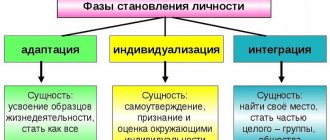All children are born with equal opportunities, but in the process of socialization, some develop their abilities, while others do not strive for anything. What do the factors of personality development depend on and what are they connected to?
The process of formation of an individual occurs under the influence of family and society. The child draws information about the world in which he lives and about society from his environment. If it is favorable, a fully developed personality is formed. Under unfavorable conditions, the formation process is not complete.
My nephew did not go to kindergarten, which negatively affected his socialization: it took him too long to adapt to the children’s group at school. My sister sent her second child to a private kindergarten, where he received all the important social skills. This ensured his adaptation to school, and gave his mother good sleep and calm nerves.
In this article I will share with you information on how to raise a child correctly.
Find out what awaits you today - Horoscope for today for all zodiac signs
Due to numerous requests from subscribers, we have prepared an accurate horoscope application for mobile phones. Forecasts will arrive for your zodiac sign every morning - it's impossible to miss! Download for free: Daily Horoscope 2020 (available on Android)
What is personality formation
Personality formation is a complex process that is not interrupted at any stage of human life. Simply put, it is infinite. The very concept of “personality” is very multifaceted, and there are two popular professional views on this phenomenon. One of them says that the formation of a child’s personality depends on natural innate data. The second opinion indicates that personality is a social phenomenon, and only society influences its formation.
In fact, the entire period of a person’s life, from birth to adulthood, is a process of personal growth or degradation. It is believed that development occurs in activities that are significant to the individual. The driving force can be called internal contradictions between the needs of a growing child and the real possibility of their implementation. The child’s activities are almost always determined by the parents and, to one degree or another, directed by them. Conclusion: the process of upbringing is the leading factor in the formation of a child’s personality.
Personal qualities of the child
Much depends on character and temperament. For example, it will be quite difficult for phlegmatic people to express themselves at school. They may begin to be considered incapable simply because of their temperament.
Children can be roughly divided into thoughtful and impulsive. The former can delve into the task and work with it as much as they need, despite the complexity. The latter are aimed at quick results, so they often give the answer that first came to mind. This makes the learning process difficult.
Also, thoughtful children avoid participating in the life of the group (class) and try not to get into unfamiliar social situations. Impulsive people easily join the team and are not afraid to take risks.
Phases of personality development
There are three phases in the formation of a child’s personality
Adaptation
Lasts from birth until adolescence. The individual assimilates social experience - he adapts, imitates, adapts. During adaptation, there is an active adoption of social norms and mastery of various forms of activity. Having shown his own individuality in the group, the child cannot express himself as an individual until he masters the norms existing in the group.
He feels the need to be like others, adapting as much as possible in society. We can talk about a kindergarten or school.
Group activities can provoke the emergence of favorable conditions for the formation of the child’s personality and those traits that were not previously inherent in the individual, but which are characteristic of other members of the group.
Personalization
The child has a desire to oppose himself to others, to stand out. A critical attitude towards the norms of society and established social rules is formed. The impetus for individualization is the contradiction between the result of adaptation and the need for personalization that was not satisfied at the initial stage. The search begins for methods that help in gaining individuality and fixing it. This can manifest itself in behavior, clothing, speech, and so on. If, during the formation of a child’s personality, he has successfully coped with adaptation, then gradually he begins to understand that individuality is being lost. The individual mobilizes internal resources and begins to search for a society capable of providing the necessary personalization.
Integration
The child has a desire to find his place in society, to fit into society. Integration is easy if society accepts the person. Other results are also possible. A person tries in every possible way to preserve his difference, which leads to aggressive interaction with society and people. Integration is characterized by contradictions between the subject’s desire to demonstrate his own individuality and the community’s desire to cultivate and approve only those individual qualities of the subject that correspond to its preferences.
School influence
At school, obedience is most valued. This often acts as a limitation for creative children. Many restrictions, rules and patterns stifle their natural originality.
Back in the twentieth century, the Italian Maria Montessori proposed an education system in which each child studies at his own rhythm, that is, individually. This led to positive results. But since freedom and independence are not allowed by society, the Maria Montessori method is not used.
What factors influence the development of a child’s personality?
Many factors influence the formation of a child's personality. From a number of theories put forward by various psychologists, the main idea should be highlighted: personality development occurs on the basis of natural data, self-awareness and life experience. Formation begins at an early age.
Internal factors influencing: temperament, inherent at the genetic level. External factors: upbringing, social level, environment, and even the current era.
Many experts believe that genes have a significant influence on personality, containing information about the ancestors of the mother and father. A newborn person continues two genera at once. This does not mean that he will receive their character traits or talents. Nature will provide him with a basis for development, and all he has to do is use it.
The significance of the biological factor is high. This explains how people who grow up under the same conditions become unique and exhibit opposite qualities. Biological factors are the basis for the formation of a child’s personality. Socialization plays an equally significant role. Development occurs in stages. The perception of the world is influenced by the upbringing received by a person and the example of his parents.
Education and personality formation in the family: the importance of parents
Psychologists are convinced that parents have a decisive influence on a child’s personality, his perception of the world, feelings and aspirations. The relationship between father and mother, as well as between other relatives, is important to him. The attitude of the family directly towards the child plays a huge role.
The surrounding social environment also influences the formation of personality. Education is a purposeful process of influencing a person, and it is precisely this that is at the basis of the cultivation of personality.
Many people ask the question: “What plays a decisive role in personal development and consciousness - natural forces, social environment?” It is impossible to single out anything separately, but it is obvious that the first years of human life are fundamental. Children growing up in a family largely adopt their parents’ behavior, attitudes, and values. Subsequently, the personality may acquire additional minor touches, but it is in childhood that the foundation is laid. If the father and mother pay little attention to the baby, then he receives “material” for development from other available sources, which are not always beneficial. Parents should remember this and take care of daily quality interaction with their child. At an early age, reading fairy tales helps a lot, as it instills in the child an understanding of good and evil. Be sure to analyze what you read and think through other options for developing the story.
Environment
The older a child gets, the more people come into his life. The initial circle of communication from parents and grandmothers is supplemented by educators and teachers in courses for children. The first friends appear, and it is not always possible to control this communication. However, it is important to know who your child is friends with. It is useful to send your baby to a children's development center - this will ensure the child's full social development in the company of creative, versatile children. Children often find like-minded people and best friends and transfer communication into everyday life.
What mistakes do parents make when raising individuals?
When shaping a child’s personality, it is important for parents to avoid such common mistakes.
Categorical prohibition
The main mistake of education. Be patient with your baby and respect him. Without learning to understand it, parents make inevitable mistakes that lead to mental and physical problems. By ignoring the desires and interests of the child, responding to most of them with categorical prohibitions, you can even skip the initial stage of some disease. Example: you notice that the child has started eating lime. The first reaction of most parents: dissatisfaction, screaming, a ban on approaching the wall. Correct reaction: visit the doctor. The doctor will probably tell you that there is a lack of calcium salts in the baby’s body. In addition, such an attitude will create in the child a desire to perform certain actions on the sly. Many become secretive and distrustful.
Overprotection
When shaping a child’s personality, overprotection is not the best helper. Excessive care can have a negative effect on the baby. When he reaches a certain age and tries to show independence, this is often met with hostility. Example: a child wants to use a spoon himself, but the mother, fearing that he will get dirty or not be able to cope, continues to feed him herself.
Overprotection manifests itself in violent action, which can result in the emergence of neurosis. In other cases, guardianship unless absolutely necessary can result in the child never being able to make friends, because the mother and grandmother are always nearby. The individual may have difficulties with socialization; he does not acquire the ability to express and defend his opinion. Possible consequences: psychological problems that can only be eliminated with the assistance of specialists.
Excessive demands
For the full development of a child’s personality, it is necessary that he not only knows, but also understands what is allowed and what is prohibited. If you show excessive demands on him, without giving clear explanations of the reasons why you need to do as you say, then this will not lead to good. What traits will the personality acquire? Irritability, stubbornness. The best option: parents explain in detail the reasons for their demands, and over time they become the child’s personal beliefs.
Notations
The first factor provoking children's protest is lengthy lectures. Parents often believe that their child will learn information better by listening to long and repetitive lectures. There is no need for them. This approach has no constructive component. Particularly taboo is other children being held up as examples. Gradually, the child will begin to perceive them as personal enemies. Boring notations often cause a negative reaction, losing their educational value.
Immense pampering of a child
Parents who spoil their children too much create a big problem. This phenomenon is no less negative than lack of influence. Spoiled children, who do not know anything to be denied, who have no responsibilities, eventually face the impossibility of overcoming even minor life obstacles and problems. When a situation arises when their desires and reality do not coincide, they lead to overstrain of the nervous system, which can result in a breakdown.
Personal motivation
To achieve your goals and be successful, you need personal motivation. And developing it in a child is one of the important tasks of parents. To do this, you need to be in contact with the child, properly organize individual and joint activities, and use non-material incentives. It is important not to make your child dependent on praise and disapproval. If you praise only for successes and reproach for failures, then instead of motivation, the child will develop a fear of defeat.
We have created an environment for the comfortable comprehensive development of children. Our classes are structured using special methods, and our teachers know how to competently develop personal motivation in a child and interest him.
What conditions will ensure successful personality formation?
Important conditions for the formation of a child’s personality.
Example of parents
It is important for a child to see that mom and dad do not follow a certain script, but really live a happy and fulfilling life. It is impossible to make another person happy if you yourself are unhappy. Many psychologists note that people who do not experience inner harmony often complain about problems in relationships with children. Only happy parents will be able to truly understand their child by building a trusting relationship with him. This contributes to the successful formation of personality. When trying to help your child with this, start with yourself. Reflect: do you know how to accept your feelings, do you allow yourself to truly be happy and sad. Or maybe you are restraining yourself and teaching your child excessive restraint, thereby suppressing his personality.
Communication with others
Show by example how to communicate with other people. Give yourself a little test by honestly answering the question: “Are you able to have an unbiased conversation with a person with whom you disagree in some aspects?” Is there a possibility that you are trying to impose an opinion on another person or are you submitting to someone else’s will? The child will probably adopt this feature from you.
Don’t impose your opinion and position – just share your values. Have you heard the definition of “heartfelt conversation”? Such dialogues arise when a person is ready to understand the interlocutor and share his opinion. In relationships, a person develops, allow yourself to learn new things and teach this to your child.
Care and attention
A person who has felt care and attention at the dawn of development will certainly feel confident and protected. Mother and father become important life references, exerting serious influence. It is great if a mother can demonstrate such qualities as forgiveness, acceptance, love. The child needs to feel affection and warmth. In a father, strictness and gentleness are important, acting undividedly.
Parents are the most important stage in the formation of personality. Everyone knows the words that raising children should begin with their own upbringing. Start with yourself if you want to help your child’s personality acquire important facets.










